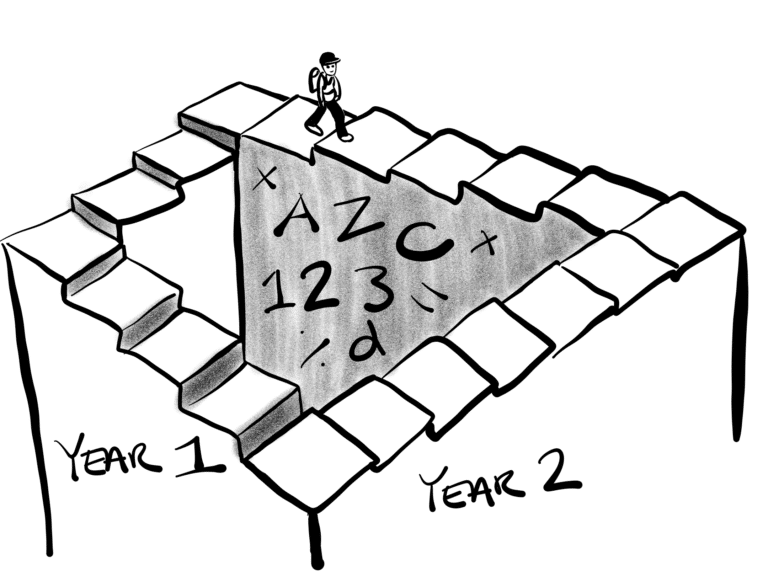
How Going Gluten-Free Transformed our Home
Hi, I’m Melissa, Beth asked me to explain how going gluten-free made a difference in our household. I have a

Here in the Southern Hemisphere, the school year runs from February until November; however, children typically start school on their 5th birthday, and it is unusual for a child to repeat a grade.
Harry had a terrible start to school.
We were out of the country for his 5th birthday, so he started school two months later. When we got back, he happily trotted off in his new uniform, keen to explore the monkey bars and playground – less eager to sit all day in a classroom.
Harry had only been at school for a week when our region was hit by a large (magnitude 7.1) quake. Thankfully, no one died; most people were safely home in bed.
The authorities checked the school buildings and decided it was safe for the children to return.
A teacher in her sixties took Harry’s class. In chats with Harry after school, I learned they spent a good deal of time watching Teletubbies, which made him very happy. I was less impressed, but I was pleased he enjoyed this relaxed introduction to school, so I said nothing.
When the new academic year rolled around in February, Harry was put into a blended Year 1- 2 class. I had my misgivings. The teacher for the twenty-five pupils was fresh out of college.
Harry only lasted a few weeks. He quickly became overwhelmed, coming home distressed. I went to see the Principal and requested she drop him back into a Year 1 class.
An experienced teacher who, to this day, is one of the best teachers Harry ever had, took the Year 1 class. She was perfect for him, and he was able to start learning.
Then, two weeks later, a magnitude 6.3 quake struck our city.
This time, it occurred during a Tuesday lunchtime. There was a massive loss of life in the city centre and a high injury toll, including some of our extended family. We also lost our home.
Due to the fact the city has no power or water, we moved an hour and a half away and enrolled our children in a school there. Harry had to survive a term in this new environment.
I have little memory of that period as I was traumatised by homelessness while trying to support grieving family members.
When we returned to the city, we decided it was essential to put the children back into their original school, and Harry’s lovely teacher welcomed him with open arms.
I’m so pleased Harry went into a Year 1 class. There were no disadvantages because the way his birthday fell meant he was at a similar age to a few of his classmates.
If you suspect your child is not ready for their school year, investigate the teachers in the year below and evaluate if one of them would be a better option.
The early years are so important. If I hadn’t been confident in the teaching options for Year 1, I would have considered moving Harry to a new school.
Advantages of repeating a year |
Disadvantages of repeating a year |
| Harry had a traumatic start due to earthquakes and only had three months of Year 0-1. If illness or trauma disrupted a year, your child might benefit from repeating that grade. | It is vital to keep your child engaged in school. If the disruption was caused by the child truanting, repeating the year will only be beneficial if the underlying issues are addressed. |
| Children with dyslexia are often emotionally less mature than their peers. Being in a younger year may be a better fit for an emotionally immature child such as Harry. | If your child is already the oldest in their year, holding them back may mean they are almost two years out of sync with their peers. Harry’s birth date meant he still fitted into the year below. |
| Harry is sporty. Being in the younger year gave him an advantage at all school sporting events. | Physically large children may stand out more if they are held back a year. Harry struggled with this. He was the tallest in his year, but it was to his advantage at sports events. |
| Adding in extra support via tutoring or having a class teacher who takes a different approach can help a child acquire the skills they missed the first time around. Harry had an excellent teacher for his repeated Year 1. | Repeating a year without changing the educational approach will likely be useless. I would not have held Harry back to watch more Teletubbies. |
| Harry was happy to go back to Year 1. He liked the teacher and enjoyed his year with her. | If Harry had opposed going back or disliked the teacher, he wouldn’t have repeated the year. Considering the effect of repeating a year on the child’s self-esteem is crucial. Doing it earlier in their school career may create the least disruption. |
I taught my son to read and spell in 30 minutes a day. Here are my affiliate links to the resources I used, All About Spelling and All About Reading.
If your child also struggles to learn the multiplication tables, check out this blog post on how using stories will help them remember the facts.
Speechify is an app that can help children at school as it reads text from websites. Here is my affiliate link https://bit.ly/3AbVxRO

Hi, I’m Beth. Seven years ago, when I discovered my son had dyslexia, I had a ‘light-bulb’ moment and understood this explained many of my own difficulties. Ever since, I’ve been on a mission to discover the best ways to wrestle what I like to call the dyslexia octopus.

Hi, I’m Melissa, Beth asked me to explain how going gluten-free made a difference in our household. I have a

I need nighttime anxiety relief. It’s 4 AM, and I’m reviewing what happened to Harry at school yesterday and wondering